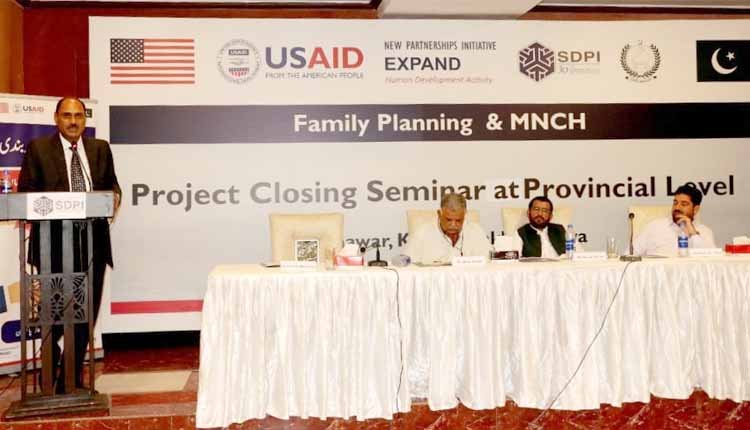Closing Seminar by SDPI Marks Culmination of Project Focused on ‘Enhancing Access and Quality of Family Planning & Maternal, Newborn, and Child Health Services in KP
PESHAWAR: No real change is possible without active engagement of the community especially youth, said Asghar Ali, Secretary Population Welfare Department (PWD) KP. He was the Chief Guest to provincial-level closing seminar of “Family Planning” and “Maternal, Newborn and Child Health” organized by Sustainable Development Policy Institute (SDPI) here today. The project aimed to improve the service delivery on family planning and maternal and child health, and create awareness by pro-active engagement through community ambassadors.
Government initiatives cannot improve family planning, maternal and child health ecosystem alone without leveraging support of civil society organizations and donor agencies to amplify advocacy efforts. He appreciated the mantle of ownership for both government-based activities and community-driven initiatives facilitated by SDPI and reiterated the commitment to strengthen collaboration with stakeholders, partners, and donor agencies for the betterment of the region’s populace. He also acknowledged SDPI and NPI EXPAND HDA support provided to local government in Buner through innovative model of Youth Ambassadors registered with the Social Welfare Department for community engagement and service.
Dr Abid Qayyum Suleri, Executive Director, SDPI remarked that in current testing times improved health of the populace is key to social development and economic stability. Strengthening the primary healthcare system significantly cuts down the economic pressure on secondary and tertiary health care, he added. He reaffirmed SDPI’s commitment to on community development and improving service delivery.
Dr Muhammad Afsar Anwar, District Health Officer (DHO) Buner, underscored interconnectedness of maternal and child health (MNCH) and family planning, noting that an effective approach to the former hinged upon prudent family planning practices. He mentioned to involve the local government in project development phase to address the community needs more effectlively.

Hussain Ahmed, District Population Welfare Officer (DPWO) of Buner, elaborated significance of counselling and community mobilization, particularly in the realm of family planning to address the unique challenges of the rapidly growing Buner district. He highlighted the pivotal role played by Youth Ambassadors (YAs), for community engagement and advocacy at the union council level.
Syed Bahadur Shah, District Officer, Social Welfare Department, Buner hailed the initiative of registering Advocacy Forums with Social Welfare Department (SWD) and said these forums can serve as advocacy platforms not limited to FP and MNCH but also other social issues. He encouraged community representatives to fully engage with organizations to catalyse meaningful change to bring about exceptional outcomes.
Rana Nazir Mehmood, Project Director, SDPI, shed light on the model of Youth Ambassadors introduced by SDPI for community service for robust advocacy on family planning and strengthening healthcare services’ structure in tehsils Daggar and Gagra. He urged the similar model of Youth Ambassadors be replicated in other areas in KP to create sustainable impact.
Waheed Zafar Senior Manager (Implementation) apprised the audience about extensive stakeholder engagement including civil society influencers (CSIs), lawyers, local government entities, educational institutions, and health awareness initiatives to fortify resilience of community’s foundational structure.
Umar Farooq, Project Manager, SDPI, emphasized the role of Youth Ambassadors (YAs) and Village Health Committee (VHC) in advocacy for family planning and MNCH and supporting meaningful into activr components of the healthcare system, poised to make meaningful contributions to community wellbeing.
Dr Muhammad Najeeb Program Manager NPI EXPAND HDA urged stakeholders particularly local government officials, to continue fostering family planning and MNCH upliftment beyond the project’s timeline. He praised SDPI for its competitive and sound capacity, underscoring the project’s successful realization of its objectives.

The seminar drew a diverse spectrum of participants from esteemed provincial seniors from Health Department and Population Welfare Department, Local Government officials, Social Welfare Department representatives, Civil Society Influencers (CSIs), Youth Ambassadors (YAs), SDPI-trained staff, and community members. The participants articulated their perspectives on the contributions and potential of civil services for advancing family planning and MNCH key messages across their respective professional spheres. They echoed support for SDPI’s initiatives, pledging their commitment to nurturing societal and individual growth through education and awareness.


